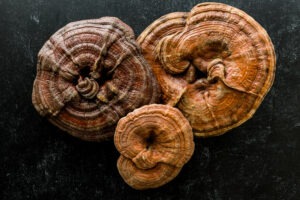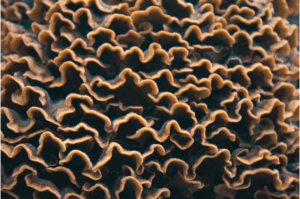We’ve just replenished our shelves with all our favourite fungi, and the new display has sparked a lot of questions in our Woy Woy store. Two in particular. The first one has a simple answer:
No, they will not get you high.
The answer to the second question, “how do they work?”, is more complex.
These fungus have been used for thousands of years, and claim physical and metaphysical benefits in traditional medicine practices – which we back with our lived experience taking them. We’ve learned Lions Mane is great for cognitive performance, Shiitake for cardiovascular health, Reishi for sleep and anxiety. Yet every mushroom we stock is rich in one thing: Beta-D- glucan, which is amazing for immunity.
Why are we all into immunity these days?
“Immunity!”. It’s plastered over so many health products and trends these days, sometimes it sounds like a buzzword. I mean, we’ve lived for thousands of years without 700 products to boost our immune health. Why do we need them now?
Well, Dr Paul Clayton, an expert in pharmaco-nutrition, has an informed theory. He says “Throughout most of human history we have lived in a pretty (microbiologically) dirty environment. A lot of bacteria, viruses, moulds and yeasts (were) present in our living quarters and also in the foods we ate…(under those) conditions our immune systems were exercised.”
From the late 1800’s food technology started to remove the polysaccharides – including the beta-glucans – from the yeast in the breads we ate. Later on, around 1950, practices like microfiltration removed the goodness from beer (comment below if you want a post on beer later).
We also get into the sterilisation of our environments. The western world became obsessed, taking a scientific application and over-applying it to the detriment of a non-scientific setting. “You don’t need to wash your hands like a doctor if you’re not a doctor” is what I’m saying. Cleanliness is not next to Godliness, so put away the bleach, we can help you.
So what do our intergenerationally atrophied immune systems need? DIRT – the benefits of that bacteria, virus, mould and yeast Dr Clayton is talking about. We need to supplement it. And the closer to nature, the less synthetically we can do that, the better.
That brings us to the Fungus
Or, more accurately, the beta-glucans in the fungus. Medicinal, aka Functional Mushrooms (found under “Tonic Herbs” in our wellness section) are extremely rich in beta-glucans. One of the greatest edible sources, next to a certain kind of algae. We ought to mention that oats and barley are also rich in beta-D-glucans, however these are less bioavailable and require a process of activation.
 There is a lot of research that suggests that beta-glucans strengthen the immune system by stimulating immune cell activity.
There is a lot of research that suggests that beta-glucans strengthen the immune system by stimulating immune cell activity.
In the innate immune system, beta-glucans bind with macrophages – a white blood cell that acts as a detective and co-ordinator for all the other immune cells. The beta-glucan binds with it and activates the macrophage, which essentially makes it perform a lot better in identifying and destroying foreign invaders.
It’s also better able to rally the rest of the immune cells and coordinate their defences, particularly in increasing antibody production and activity, which works to bind the foreign invaders together so they can be destroyed more quickly.
Brutal. It’s like giving an army extra-human ability.
At this point I have to take a minute to just be in awe of the human immune system. That’s just one function and interaction, in response to one supplement. Incredible.
So what separates Mushrooms from Oats and Algae?
As mentioned, immune-enhancing beta-glucans are found in other foods and supplements, and it’s down to your individual needs whether mushrooms are for you.
One benefit of mushrooms is they each have a unique composition of other vitamins, minerals, polysaccharides, triterpenoids and peptidoglycans that benefit the immune system and beyond, like
- Balancing hormones
- Cleansing blood
- Promoting neural growth factor (NGF)
- Lowering cholesterol levels
- Regulating blood sugar
- Clearing lungs
And so many more for short and long term health and wellbeing.
We also have a deep appreciation for the long history of mushrooms in holistic health practices like Traditional Chinese Medicine, Ayurveda and Daoism. These approaches suggest mushrooms work on the body’s organs and meridian systems. Additionally, that they balance and restore the function, health and wellbeing of our essence, energy and spirit.
Lastly, unlike oats and algae, you can find Mushrooms in synergistic blends that target specific health issues and life phases.
Those are the reasons we like them.
A note on dosage
A secret bonus third question! “How much do I take?”.
Always start small with herbs and work your way up. They’re often more powerful than we realise, and need to be introduced to the body slowly. 100mg is a starting daily dose for mushrooms. Increase from there, up to 250mg/day. A large dose is 400mg – anything beyond that you’re likely overdosing on this herb, and you might need something different to address your issue.
As always, we are not experts, just individuals on our own journey to understanding herbs and living a sustainable, healthy lifestyle. There is an abundance of information out there on medicinal mushrooms and beta-glucans, and we support you to do your own research and consult with your health advisor when deciding what’s best for your health. That said, we’re always up for a chat. Comment or contact us at info@hempstore.com.au.
And stay well Hempsters
Leave a Reply